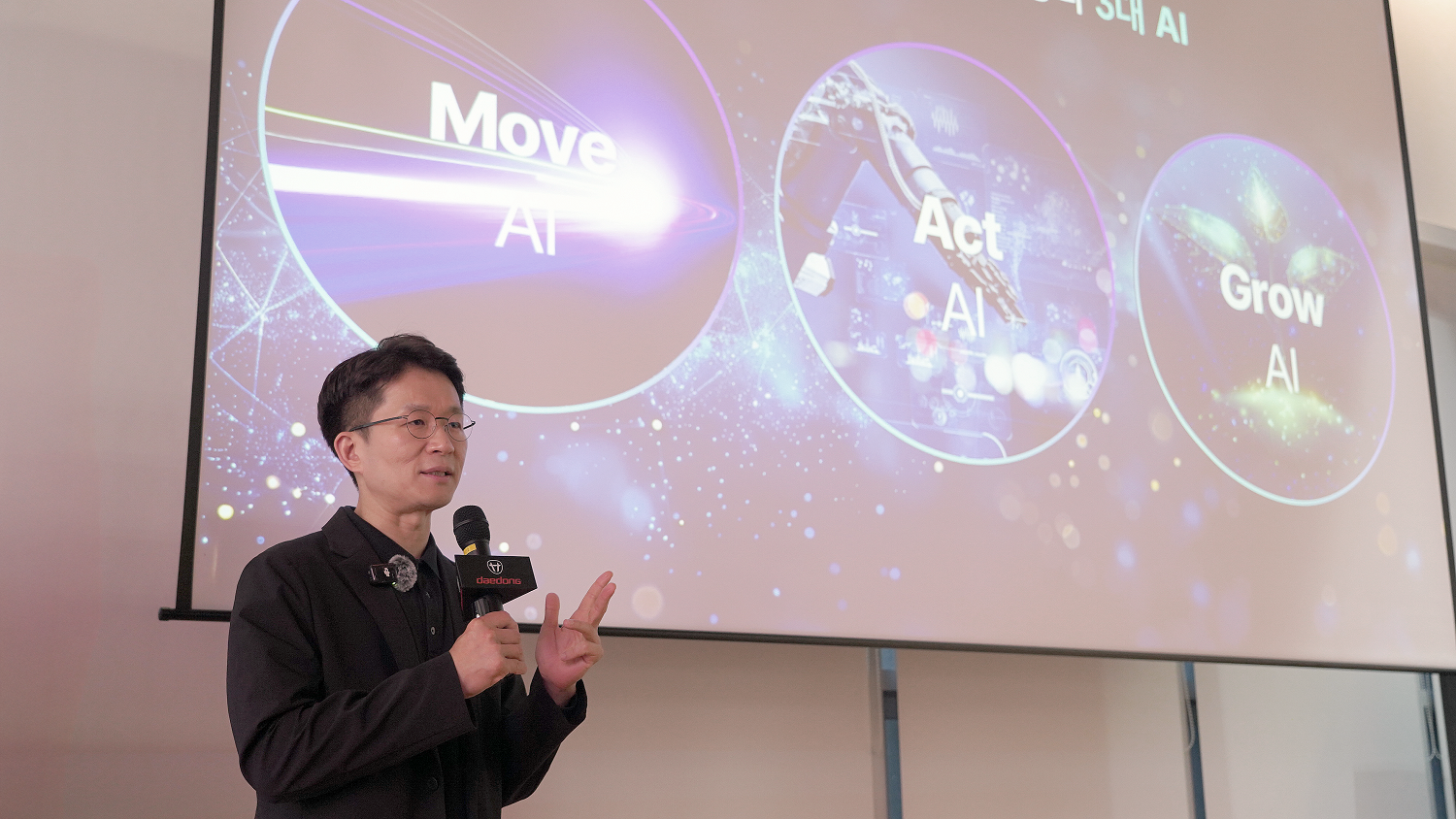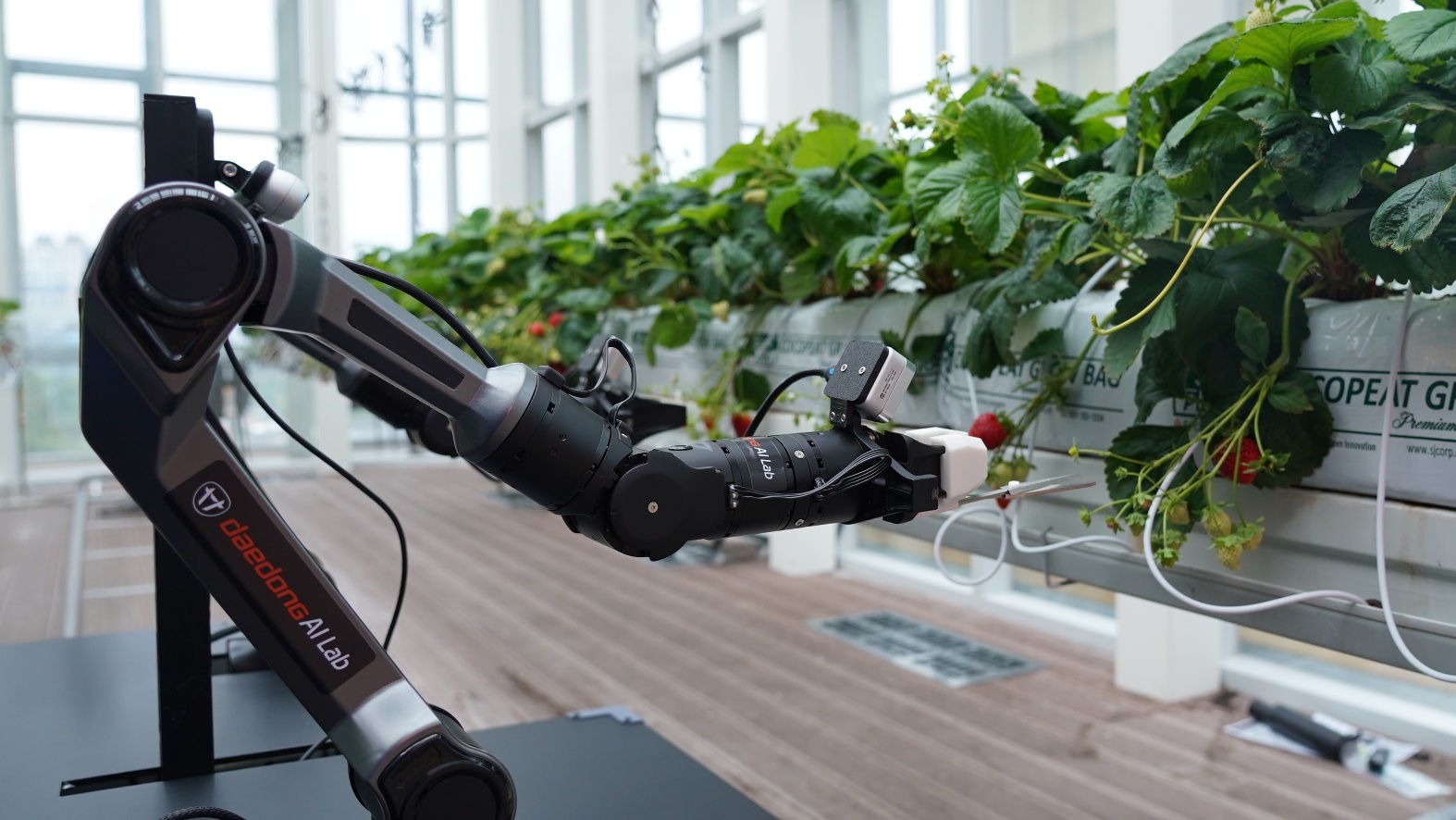Daedong AI Lab to Advance Three Core AI Domains in Agriculture: "Mobility, Operations, and Cultivation"
"Aiming to Lead Agricultural Innovation with Physical AI and Agentic AI"
Daedong AI Lab to Advance Three Core AI Domains in Agriculture: "Mobility, Operations, and Cultivation"
- Daedong Group sets out to drive a major "AI transformation in Korean agriculture" through its three core AI domains: Mobility, Operations, and Cultivation... maximizing productivity and efficiency
- Vision-based autonomous driving and Physical AI will accelerate the robotization of agricultural machinery and the development of next-generation agricultural robots to replace manual labor
- Crop-specific AI cultivation technologies will help enhance farm profitability, while the LLM-based chatbot "AI Daedongi" will be expanded with Agentic AI capabilities
Daedong (Co-CEOs Kim Jun-sik and Won Yu-hyun), a leader in future agriculture, announced on July 17 through its AI robotics software subsidiary, Daedong AI Lab (CEO Choi Joon-gi), that it held a media briefing at the Daedong Seoul Office in Seocho-gu, Seoul, to present its development strategy for the company’s three core agricultural AI domains.

With this initiative, Daedong Group is aiming to maximize productivity and efficiency by leading Korea’s agricultural sector through a full-scale "AI transformation." Daedong AI Lab plans to achieve this vision by developing AI technologies focused on three core areas: "Mobility," "Operations," and "Cultivation." These technologies will be applied across the group’s businesses, such as smart farm machinery, agricultural robots, precision farming, and smart farming solutions. The company’s goal is to become a leading agricultural AI specialist by realizing what it calls "AI-powered future farming." In this model, AI-driven machinery and robots can make independent decisions to carry out fieldwork, while cultivation AI can predict crop growth and recommend optimal strategies.
■ Mobility AI: Vision-based Autonomous Driving for Farmland
The first pillar, Mobility AI, is designed to help agricultural machinery and robots determine their driving paths independently and perform tasks efficiently, even in unstructured outdoor environments. For "Mobility AI" to function effectively, vision-based autonomous driving technology is essential. This is because conventional GPS-based autonomy has clear limitations when it comes to recognizing field boundaries or responding to obstacles. To address this, since last year, Daedong AI Lab has collected approximately 500,000 images of orchards and fields along with about 3 million driving video samples. This has enabled the company to build the largest agricultural dataset in Korea, which is now being used to develop autonomous driving AI optimized for local farming environments.
Starting with the flagship tractor equipped with Level 4 autonomy, scheduled for release in the first half of 2026, Daedong AI Lab plans to expand the application of "Mobility AI" across the group’s agricultural machinery and robots, including improving autonomous driving performance in transport robots. Daedong AI Lab is also building a Machine Learning Operations (MLOps) system. This framework will continuously incorporate customer operation data into AI training, further advancing performance and establishing a distinct competitive edge in autonomous driving technology.

■ Operations AI: Physical AI for Replacing Manual Farm Work
The second pillar, "Operations AI," refers to Physical AI technologies that enable agricultural machinery and robots to perform a wide range of tasks, including tilling, seeding, fertilizing, crop protection, and harvesting. The goal of this technology is to automate the labor-intensive work traditionally performed by humans, thereby improving both efficiency and sustainability in the agricultural field.
According to statistics from the Rural Development Administration, the mechanization rate in Korea’s agricultural sector shows a stark imbalance: while paddy farming has reached about 98% mechanization, the rate falls to 67% for dry-field farming and only 31% for orchards. Even in rice farming, where the mechanization rate is close to 100%, agricultural machines still require direct human operation, which means the sector remains labor-intensive. To address this challenge, Daedong is promoting the "robotization" of agriculture, where machinery can make its own decisions and carry out tasks based on the farming environment and crop growth conditions. The company is focusing on developing Physical AI technologies to introduce a new generation of agricultural robots into the field.
As a first step, development is centered on tillage, which is the primary task performed by tractors. The autonomous work model being developed uses cameras and sensors to analyze soil conditions and evaluate work quality in real time. This model is designed to reduce working time by up to 30% and improve fuel efficiency by around 15% compared with conventional autonomous systems. In the future, the technology will be applied more broadly to attachments such as loaders, grippers, and fertilizer spreaders.
Daedong AI Lab is also accelerating the development of agricultural robot AI for strawberry and tomato cultivation by advancing its multifunctional robot based on “imitation learning,” which was first unveiled at CES 2025. During the media briefing, a live demonstration showed a robot equipped with two arms performing strawberry harvesting, leaf removal, and data collection through remote operation.
Daedong AI Lab has developed technology that allows AI to learn instantly while a human remotely operates the robot. The company is also systematically accumulating agricultural task data, categorized by crop, task type, and stage of work. This effort is aimed at building early competitiveness that can be immediately applied to farming once Physical AI becomes widely adopted in factories and households. Since vast amounts of data are expected to be the core competitive advantage in the era of Physical AI, Daedong AI Lab plans to leverage its data assets to establish a leading position in agricultural Physical AI.
■ Cultivation AI: Predicting Crop Growth to Deliver Cost Savings and Higher Yields
The final pillar, "Cultivation AI," is a technology designed to replicate the experience and expertise of skilled farmers, enabling anyone to achieve stable crop production. By using data collected from satellites, drones, and smart farm machinery, the system predicts crop growth patterns and provides tailored cultivation strategies. In the open-field sector, Daedong Group has commercialized Korea’s first precision farming service for rice after four years of field testing. In the greenhouse sector, Daedong AI Lab is developing cultivation AI specifically for smart farms and orchard management.
Last year, the company also developed a greenhouse environment prediction model that collects various data points, including temperature, humidity, carbon dioxide levels, and light intensity, to allow AI to predict changes in the growing environment. The company completed its field testing in the first half of this year and is now accelerating the development of strawberry growth prediction AI, with the goal of completion by the first quarter of 2026. This technology allows farmers to forecast harvest periods in advance, plan production schedules more accurately, and adjust both planting volume and harvest timing. As a result, it enables a farming model that reduces costs while increasing profitability. Looking ahead, Daedong plans to enhance its "AI Daedongi" agricultural LLM chatbot into an Agentic AI platform. This will allow any farmer to easily ask cultivation-related questions and receive optimal strategies tailored to their needs.
Meanwhile, government-level initiatives such as the "Agricultural Robot Demonstration Support Project" led by the Korea Institute of Agricultural Technology Promotion and the Ministry of Agriculture, Food and Rural Affairs’ policy to introduce precision farming in the Saemangeum Agro-Bio Complex are providing strong support, further reinforcing consensus on the need to expand the adoption of AI in agriculture. Daedong Group plans to apply its precision farming solutions to the Saemangeum farmland in the second half of this year, carrying out demonstrations that include satellite data collection, drone swarm flights, and smart attachments. The company also intends to launch an advanced model of its transport robot, equipped with both remote-control and autonomous driving functions, while continuing to upgrade its "Mobility AI."
